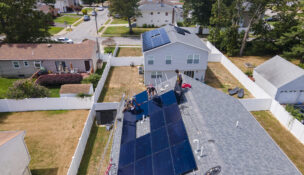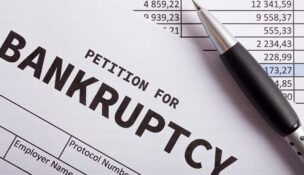Appeals court ruling allows Badger Coulee project to continue
By: WISCONSIN LAW JOURNAL STAFF//June 1, 2018//
Appeals court ruling allows Badger Coulee project to continue
By: WISCONSIN LAW JOURNAL STAFF//June 1, 2018//
The construction of a $580 million high-voltage power line between Holmen and Madison will continue after an appeals court decided on Wednesday to uphold a lower court’s ruling on the project.
The Wisconsin Court of Appeals largely sided with La Crosse County Circuit Judge Todd Bjerke, who handed down a ruling in 2017 finding that the Wisconsin Public Service Commission had followed state law in approving the 186-mile Badger Coulee project.
The legal dispute over the project arose when the La Crosse County town of Holland sued the PSC in 2016, arguing the agency had failed to fully assess the effects of the line. The plaintiffs also argued the project’s construction would be onerous for both utility customers and land owners.
Even though the appeals court largely agreed with Bjerke, it struck down part of his ruling. The appeals court found the plaintiffs were right when they argued the Badger Coulee line should not share towers with another line, the new CapX2020 high-voltage line, which runs for 7 miles along Wisconsin Highway 53 in La Crosse County.
Once built, the Badger Coulee line will go from the La Crosse area to Madison, connecting to the CapX2020 line and bringing power into Wisconsin from Minnesota. The project is being overseen by American Transmission Co. and a group of utilities that include Xcel Energy, WPPI Energy and La Crosse-based Dairyland Power Cooperative.
Electricity customers in 15 Midwest states and one Canadian province will share the costs of the project. Wisconsin consumers are expected to pay about $87 million.
“The PSC takes into account additional relevant factors in making its determination, such as increased reliability, economic benefits, and public policy considerations,” the appeals court wrote in its decision. “In short, the PSC applies a broader definition of ‘reasonable needs,’ as opposed to the narrow interpretation advanced by the Town.”
Kaya Freiman, an American Transmission spokeswoman, said Thursday that the appeals court ruling lifted an injunction and allows the company to continue building the 7-mile section of the high-voltage line. The company, she said, worked east to west on the project and is on-schedule to complete the line in late 2018.
In its suit, the town of Holland argued that the Badger Coulee line was unnecessary because population projections hadn’t shown enough growth to justify the construction of the high-voltage line. They also contended electricity use is declining in Wisconsin.
The appeals court, meanwhile, ruled the PSC, when giving its blessing to the line’s construction, had no access to studies showing low population growth and declining electricity use. The PSC later examined the data and found they provided no reason for scrapping the project.
“(The PSC) therefore deemed the new evidence not sufficiently strong to reverse or modify its decision, and denied the petition for rehearing,” the court wrote in its ruling.
Rob Danielson, secretary of Save Our Unique Lands, a nonprofit group that opposed the Badger Coulee line, said Thursday that the PSC had failed to weigh the project’s costs and benefits to rate-payers. He also said the project’s owners will reap returns even while doing nothing to improve energy conservation in the region.
Ultimately, the appeals court sided with the PSC because Wisconsin law requires that courts defer to public agencies when their decisions are deemed reasonable, Danielson said. The court’s job is not to conduct a detailed analysis of the PSC’s decision to build the Badger Coulee line, he said.
“The big culprit is that state law simply doesn’t provide measurables,” he said. “It simply has to be reasonable. That was why the town of Holland was saying, ‘Look, this is a lot of liberty here granted to the applicants. They aren’t protecting the rate-payers.'” Follow @natebeck9
Legal News
- Amended complaint filed in federal court against State Bar of Wisconsin seeks punitive damages
- United Healthcare suit against cancer drug distributor time-barred
- Trump’s Wisconsin visit warns of jail time if he violates a trial gag order
- Dane County court overturns residential solar decision
- Judge faces formal complaint from state board
- Bankruptcies up 16% in U.S.
- (Updated) Wisconsin law enforcement clash with pro-Palestinian Madison protestors
- Gov. Evers seeks applicants for Lafayette County Circuit Court
- Complaint against University filed by Wisconsin law firm over $1.9M given to Palestinian students
- Hush money trial judge raises threat of jail as he finds Trump violated gag order, fines him $9K
- Active shooter ‘neutralized’ outside Wisconsin middle school
- Audit finds Wisconsin Capitol Police emergency response times up, calls for better tracking
WLJ People
- Power 30 Personal Injury Attorneys – Russell Nicolet
- Power 30 Personal Injury Attorneys – Benjamin Nicolet
- Power 30 Personal Injury Attorneys – Dustin T. Woehl
- Power 30 Personal Injury Attorneys – Katherine Metzger
- Power 30 Personal Injury Attorneys – Joseph Ryan
- Power 30 Personal Injury Attorneys – James M. Ryan
- Power 30 Personal Injury Attorneys – Dana Wachs
- Power 30 Personal Injury Attorneys – Mark L. Thomsen
- Power 30 Personal Injury Attorneys – Matthew Lein
- Power 30 Personal Injury Attorneys – Jeffrey A. Pitman
- Power 30 Personal Injury Attorneys – William Pemberton
- Power 30 Personal Injury Attorneys – Howard S. Sicula











